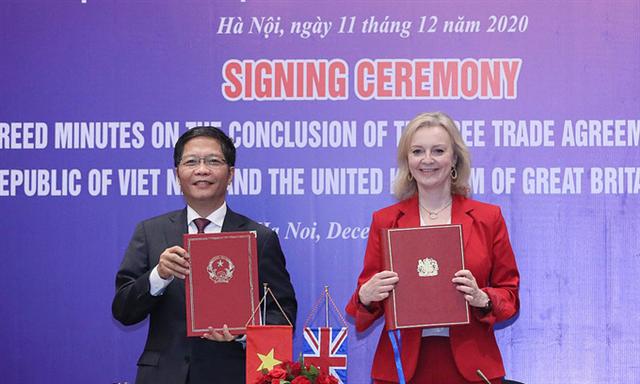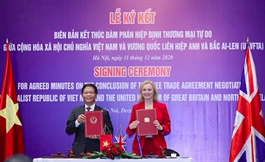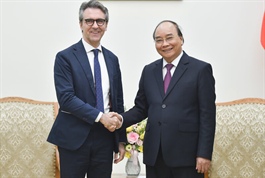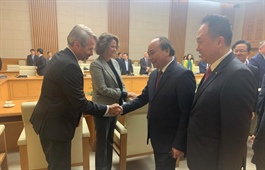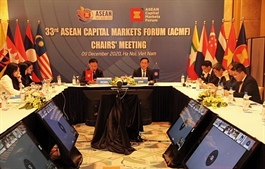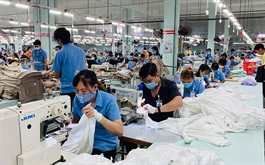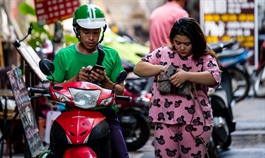Vietnam, UK conclude bilateral trade pact negotiations
Vietnam, UK conclude bilateral trade pact negotiations
Vietnam and the U.K. have concluded negotiations on a bilateral free trade pact that will maintain their existing relationship in the EU-Vietnam FTA.
Minister of Industry and Trade Tran Tuan Anh and UK International Trade Secretary Elizabeth Truss at the signing ceremony, December 11, 2020. Photo courtesy of the MoIT.
|
Minister of Industry and Trade Tran Tuan Anh and U.K. International Trade Secretary Elizabeth Truss signed Friday afternoon a joint ministerial statement on the conclusion of the Vietnam - U.K. Free Trade Agreement (UKVFTA).
The bilateral deal locks in the benefits of both countries’ existing trading relationship under the EU-Vietnam FTA that took effect August 1, eliminating 99 percent of import duties for both parties after seven years.
With the U.K. leaving the European Union, its rights and obligations under the EVFTA will cease to apply after December 31, 2020.
"The signing of the joint statement today is an important step for the two countries towards an early signing of the UKVFTA in the coming time," said minister Tuan Anh.
The U.K. and Vietnam have been holding talks on the UKVFTA since August this year, and uninterrupted trade relations between the two countries can be maintained if the free trade agreement is signed soon, he added.
"The U.K. and Vietnam share a strategic commitment to global trade and the free flow of capital of and investments. Our deal with Vietnam is an important step towards the U.K.’s accession to Comprehensive and Progressive Agreement for Trans-Pacific Partnership (CPTPP) which we aim to formally apply for in early 2021," Truss said.
Since the UKFTA will have terms largely the same as the EVFTA, both countries will not have to go through further lengthy negotiations, and both wish to conclude the agreement as soon as possible to push post Covid-19 pandemic recovery.
By the time the pact begins full implementation, Vietnam stands to benefit from tariff savings of £114 million ($149.89 million) on Vietnamese exports. For U.K. exports, this figure will be £36 million ($47.33 million), Truss said.
In an article on the government portal, the Ministry of Industry and Trade (MoIT) said that Vietnam will have more competitive advantages compared to countries like China, India, Thailand, Malaysia and Indonesia, who are not likely to conclude trade agreements with the U.K. for years to come.
Vietnam will also have more opportunities for cooperation, investment, technology transfer, and attracting British tourists as the Covid-19 pandemic is contained. The conclusion of negotiations today also sends a positive message about the relationship between Vietnam and the U.K. as the two countries celebrating 10 years of their Strategic Partnership Agreement, the ministry said.
Under the UKVFTA, the U.K. will abolish import taxes on 99.2 percent of tariff lines within 6 years, equivalent to 99.7 the percent of export turnover of Vietnam to the country, further boosting two-way trade, which has tripled between 2010 and 2019 to £5.7 billion.
While the EU has committed to giving Vietnam a tariff rate quota (TRQ) with an import tax of 0 percent for some products, the U.K. said it will consult EU statistics on bilateral trade between Vietnam and the U.K. in the 2014-2016 period to come up with a similar policy.
The U.K. also commits to review and increase the TRQ amount for Vietnam's rice products after three years from the day the UKVFTA takes effect. Export industries expected to benefit greatly from this agreement include seafood, rice, textiles, wood, vegetables and footwear.
Vietnam will remove 48.5 percent of tariff lines, accounting for 64.5 percent of import turnover as soon as the agreement comes into effect. After six years, 91.8 percent of tariff lines will have been abolished, equivalent to 97.1 percent of the import turnover, and this will further increase to 98.3 percent of the tariff lines (accounting for 99.8 percent of the turnover).
The UKVFTA also contains rules on origin, food safety and hygiene, technical barriers to trade and services, investment, intellectual property and sustainable development that are similar to the EVFTA, but tailored to suit Vietnam and the U.K.’s bilateral needs.
The U.K. is currently Vietnam’s third largest trading partner in Europe (after Germany and the Netherlands). In terms of investment, by the end of August 2020, the U.K. had 400 ongoing investment projects in Vietnam with a total registered capital of $3.6 billion, ranking 16th among the countries and territories with a business presence in the country.


